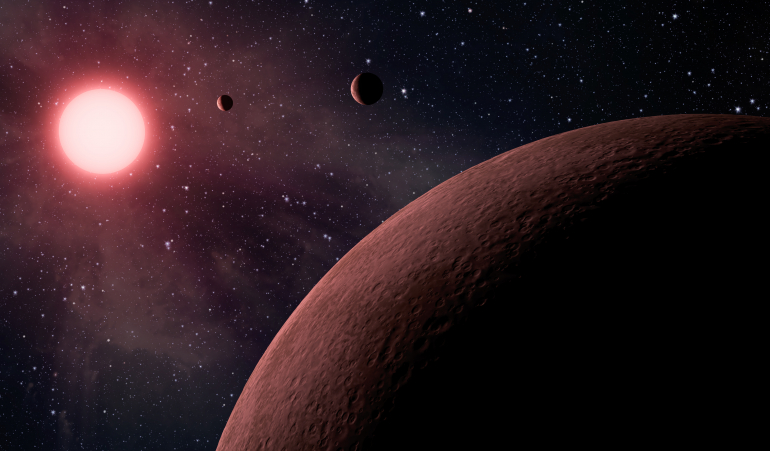
Dr Michaël Gillon, a scientist from the University of Liège and the Institute of Astrophysics, has discovered together with NASA seven potentially habitable planets.
Last year, Dr Gillon, an astrophysicist from the University of Liège, made a major discovery. In May 2016, an international team led by Dr Gillon, announced in the journal Nature that they discovered an exoplanet system called TRAPPIST-1, a dwarf star located 40 light-years away from Earth, with 3 exoplanets orbiting around it.
Today, the intensive monitoring of the system linked to NASA enabled the astronomers of the ULg not only to confirm their results but also to reveal the presence of 4 other planets in the system, thus reaching the number 7. “TRAPPIST-1 system is the biggest treasure trove of earth-size planets ever discovered around one single star”. This discovery, published this week in the journal Nature, revives the search for life in the Universe.
These planets are particular in the way that they are similar to Earth in terms of temperature and size and they could have liquid water on their surface. This is true for at least three of them that are orbiting in the “habitable” zone of the star.
Thanks to this discovery, TRAPPIST-1 is therefore the system that presents the highest number of rocky planets and the highest number of potentially habitable worlds ever discovered so far.
“TRAPPIST-1 system is the biggest treasure trove of earth-size planets ever discovered around one single star”, says Michaël Gillon. “This is a fascinating planetary system, not only for the number of planets that it harbors but also because they present characteristics very similar to Earth!”
These new fundamental discoveries put the University of Liège and the scientific community of our region in the front line of the search for life elsewhere in the Universe”, says Jean-Claude Marcourt, the Minister for Research and Higher Education.
He added: “In Wallonia and particularly in Liège in the space and astronomy sectors, we have been developing a special expertise for years with the Space Center of Liège, the Advanced Mechanical and Optical System company (AMOS) and the engineering company Ateliers de la Meuse, among others. This represents a historical recognition for Wallonia, which acts as a pioneer in space exploration. We are on the cutting edge of the research of other habitable worlds, only a few months after Belgium was chosen by Europe to be the host country for GALILEO, the European Union Global Satellite Navigation System (GNSS)”.